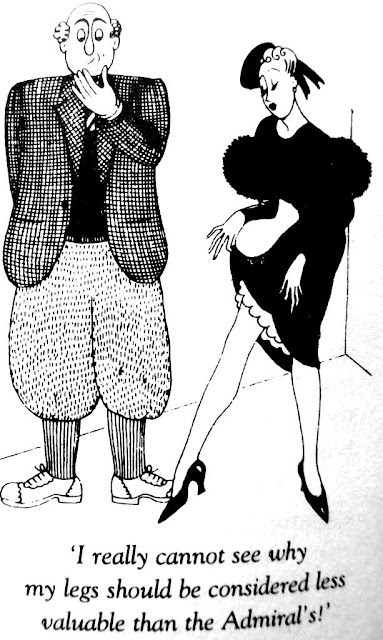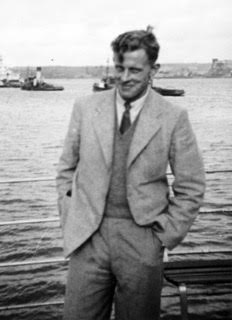Continued from 26 Jan 1942:
Fighting with ‘The Forgotten Air Force’: SERGEANT
DERYK VAUGHAN SAUNDERS (1920-42)
https://budleighpastandpresent.blogspot.com/2020/12/ww2-75-26-january-1942-fighting-with.html
Writing
about Budleigh and WW2 it’s impossible to ignore Joyce Dennys’ books, ‘Henrietta’s
War’ and ‘Henrietta Sees It Through’. Published respectively in 1985 and 1986, both
books are based on letters purportedly written by Henrietta Brown, the doctor’s
wife in a small Devon coastal town to her childhood friend Robert.
Front page of the 12 May 1915 issue, featuring
Rita Jolivet, British actress who survived the sinking of the RMS Lusitania. Photograph by Foulsham and
Banfield, Ltd.
The
letters are dated from 1939 to 1945 and were originally published in the ‘The
Sketch’, a glossy illustrated weekly journal, which focused on
high society and the aristocracy and ran for 2,989 issues between 1 February
1893 and 17 June 1959. They
reflect in a tongue-in-cheek way the goings-on and characters of the ‘Home
Front’ as people dealt with the daily challenges of World War Two.
An amusing Budleigh bathroom
mural by Joyce Dennys
You
could say that the ‘Henrietta’ books are a gentle and witty caricature of Budleigh
Salterton, as indeed are Joyce Dennys’ paintings. It’s always been easy to poke
gentle fun at our little town, as did Dennys’ friends and fellow-residents the
writers R.F. Delderfield and V.C. Clinton-Baddeley. And I won’t remind you of
what Noel Coward wrote in that play.
How
can one reconcile Joyce Dennys’ arch humour with such a grim and tragic
subject? Perhaps one should simply accept that her humorous style was just what
Britain needed to help maintain its stiff upper lip.
General Lancelot Dennys, right,
with General Archibald Wavell Photo courtesy of Nicholas Dennys
QC
Was
she really impervious to people’s personal tragedies? It seems unlikely: she
lost her much-loved brother Lance in an air crash in March 1942.
And
yet Budleigh is portrayed comically – far from the reality of the War. It’s true
that in her first letter of ‘Henrietta’s War’, dated 18 October 1939, she
writes: ‘Here we go on much as usual and one feels faintly ashamed of being in
such a safe area.’ But then, this was
the period of ‘The Phoney War’…
By
the time of the letters in ‘Henrietta Sees It Through: More News From The Home
Front 1942-45’, WW2 had become a desperate struggle for survival for Britain,
faced with the threat of Nazi invasion. Yet the country, it must have appeared to
many, was clearly divided between the hell of cities like London, Coventry and
Bristol and the relatively peaceful oases of small towns like Budleigh. Hence
the scornful view of the outsiders whom Dennys refers to as ‘the Visitors’; she
quotes in a letter of 25 February 1942 their bitter ‘What you all need is a stick of bombs to wake you up.’
Later in the book, in a letter dated 6
September 1944, Henrietta tells Lady B. that Londoners ‘are just a wee bit
cross with us for not having the Flying Bombs here.’
In
‘Henrietta Sees It Through’, Dennys succeeds beautifully in expressing the secret
hurt that many little oasis-like communities such as Budleigh were
experiencing. In the face of such mockery by Londoners and other ‘Visitors’, Budleigh
Salterton maintains its quietly dignified stiff upper lip, but inwardly
suffers: ‘Those people here whose homes have actually
been destroyed by bombs, or who have suffered loss and anxiety on account of
the war, take these remarks very much to heart.’
It’s in that letter of September 1944 that Joyce Dennys succeeds in combining high comedy and
deep pathos. The grief of a Budleigh couple – namely The Admiral and his wife
Alice ‘Mrs Admiral’ and their friends – is expressed in so understated a way,
with tiny gestures that say so much. Henrietta’s husband Charles is godfather
to the Admirals’ son Teddy.
The Admiral and Faith, drawn by Joyce Dennys
The depiction of their grief is all the more
effective for being contrasted with how the Admiral has been previously introduced
to us. A letter of 3 June 1942 had focused on a Sunday morning discussion ‘charged
with sex-antagonism’ because only 95 people had voted for equal compensation
for women who get injured in air raids. Joyce Dennys’ drawing shows an embarrassed-looking
Admiral unable to answer the glamorous divorcée Faith’s challenging statement: ‘I really cannot see why my
legs should be considered less valuable than the Admiral’s!’
And in the following scene,
Henrietta Brown is no longer the timid, self-deprecating put-upon wife portrayed
by the author in her two books. When the Admiral turns up unannounced on
Henrietta’s doorstep she reacts instinctively. But let Joyce Dennys’ words
speak for themselves:
‘As soon as I saw his face I knew something
must have happened to Teddy, their younger boy, in France. ‘We’ve had bad news,
Henrietta,’ he said. ‘I expect you can guess what it is.’
Mrs
Admiral and Henrietta Brown
Henrietta
accompanies the Admiral back to his house, where Alice is frying some fish for
lunch:
‘She was quite calm, but her face looked
different. I put my arms round her and kissed her, and then took the frying-pan
out of her hand. The Admiral looked at us helplessly for a moment and then went
out of the room.
Mrs Admiral sat down on a kitchen chair and
picked up a corner of her apron and examined it closely. ‘I keep thinking about
him when he was a little boy,’ she said in a careful voice.
‘He
was a dear little boy.’
‘They
both were. It’s hard on their father, losing both his splendid sons.’
Then
there was a silence. I turned the fish over and there was a great spluttering. ‘Hake
does spit so,’ said Mrs Admiral. Then she said, ‘We’re not telling anybody,
because of the croquet this afternoon.’
The stiff upper lip. Croquet must go on,
especially in Budleigh Salterton. A ‘Daily Telegraph’ article from 2001 about
the town by journalist Simon Heptinstall mentioned his discovery in the local
museum of a
document entitled ‘The Croquet Club - The First Hundred Years’. The entry for September 1939 ran: ‘Sunday
afternoon play agreed. War declared.’
So the croquet went on, and Mrs Admiral insisted
on her croquet game arranged with the delightfully named Mrs Whinebite. Henrietta describes how some Visitors from the
hotel wander into the club and pause on the far side of the croquet lawn. Every
woman, notes Henrietta in her letter, feasts her eyes hungrily on the Lady
Visitor’s duck-egg linen suit.
‘My dear, croquet!’ said the Lady
Visitor to her companion. Then she gave a little scream. ‘Oh! And bowls, too!
How sweet! Of course, these people simply don’t know there’s a war on!’
The
Admiral dropped his pipe on the grass. As he stooped to pick it up he laid his
hand for a moment on Mrs Admiral’s knee.’
The next post (The Admirals’ Grief, Part ii) is for
Second Lieutenant John Barham Leahy (1920-42).
He was killed on 1 February 1942 in the Battle of Singapore.
You can read about him at
These ‘orphans’ are listed on Budleigh Salterton War
Memorial, but have not been identified. Their first names,
date of death and service numbers are not known.
They are recorded on the Devon Heritage website as
'Not yet confirmed’
If you know anything which would help to identify them,
please contact Michael Downes on 01395 446407.
F.E. Newcombe
F.J. Watts









Comments
Post a Comment